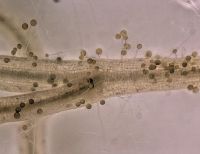SARS-CoV-2 is a coronavirus, so named because spike proteins on its surface give it the appearance of a crown (‘corona’). The spike proteins bind to ACE2, a protein receptor found on the surface of cells in our body. Both the spike protein and ACE2 are then cleaved, allowing genetic material from the virus to enter the host cell. The virus manipulates the host cell’s machinery to allow the virus to replicate and spread.
As SARS-CoV-2 divides and replicates, errors in its genetic makeup cause it to mutate. Some mutations make the virus more transmissible or more infectious, some help it evade the immune response, potentially making vaccines less effective, while others have little effect.
Towards the end of 2020, Cambridge scientists observed SARS-CoV-2 mutating in the case of an immunocompromised patient treated with convalescent plasma. In particular, they saw the emergence of a key mutation - the deletion of two amino acids, H69/V70, in the spike protein. This deletion was later found in B1.1.7, the variant that led to the UK being forced once again into strict lockdown in December (now referred to as the ‘Alpha variant’).
Now, in research published in the journal Cell Reports, researchers show that the deletion H69/V70 is present in more than 600,000 SARS-CoV-2 genome sequences worldwide, and has seen global expansion, particularly across much of Europe, Africa and Asia.
The research was led by scientists at the University of Cambridge, MRC-University of Glasgow Centre for Virus Research, The Pirbright Institute, MRC Laboratory of Molecular Biology, and Vir Biotechnology.
Professor Ravi Gupta from the Cambridge Institute of Therapeutic Immunology and Infectious Disease at the University of Cambridge, the study’s senior author, said: “Although we first saw this mutation in an immunocompromised patient and then in the Kent – now ‘Alpha’ – variant, when we looked at samples from around the world, we saw that this mutation has occurred and spread multiple times independently.”
Working under secure conditions, Professor Gupta and colleagues used a harmless form of the virus that displays SARS-CoV-2 spike proteins with the H69/V70 deletion to understand how the spike protein interacts with host cells and what makes this mutation so important.
When they tested this virus against blood sera taken from fifteen individuals who had recovered from infection, they found that the deletion did not allow the virus to ‘escape’ neutralising antibodies made after being vaccinated or after previous infection. Instead, the team found that the deletion makes the virus twice as infective – that is, at breaking into the host’s cells – as a virus that dominated global infections during the latter half of 2020. This was because virus particles carrying the deletion had a greater number of mature spike proteins on their surface. This allows the virus to then replicate efficiently even when it has other mutations that might otherwise hinder the virus.
“When viruses replicate, any mutations they acquire can act as a double-edged sword: a mutation that enables the virus to evade the immune system might, for example, affect how well it is able to replicate,” said Professor Gupta.
“What we saw with the H69/V70 deletion was that in some cases, the deletion helped the virus compensate for the negative effects that came with other mutations which allowed the virus to escape the immune response. In other words, the deletion allowed these variants to have their cake and eat it – they were both better at escaping immunity and more infectious.”
Dr Dalan Bailey from The Pirbright Institute, who co-led the research, added: “In evolutionary terms, when a virus develops a weakness, it can lead to its demise, but the H69/V70 deletion means that the virus is able to mutate further than it otherwise would. This is likely to explain why these deletions are now so widespread.”
Bo Meng from the Department of Medicine at the University of Cambridge, first author on the paper, said: “Understanding the significance of key mutations is important because it enables us to predict how a new variant might behave in humans when it is first identified. This means we can implement public health and containment strategies early on.”
The research was supported by Wellcome, the Medical Research Council, the Bill & Melinda Gates Foundation and the National Institute for Health Research (NIHR) Cambridge Biomedical Research Centre.
Reference
Meng, B, Kemp, SA, Papa, G, Datir R, Ferreira, IATM et al. Recurrent emergence of SARS-CoV-2 spike deletion H69/V70 and its role 1 in the variant of concern lineage B.1.1.7. Cell Reports; 8 June 2021; DOI: 10.1016/j.celrep.2021.109292
















